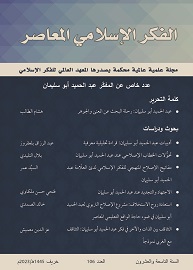Abstract
This article explores the reformist contributions of the Muslim scholar AbdulHamid AbuSulayman and his methodology in constructing a civilized nation. It attempts to capture how AbuSulayman defines a holistic and universal Qur’anic vision for civilizational building and his approach to calibrating contemporary human reality with that vision. Moreover, it aims to understand how both idealism and realism factor in his reform methodology. The study engages with the issue of cognitive distortions, which are represented in several forms, including: distortion of the Islamic holistic vision, lack of awareness of the organic relationship between the pillars of Islam and civil acts, and a misunderstanding of the purpose of life—which should be, for a Muslim, to worship God and to strive towards righteous actions. The study contends that detrimental to the progression of Muslim communities is the neglect—in its social and juristic discourse—of ijtihad and reason-based thought responsive to the changes of time and place, and instead has been entrapped by a repressive discourse that is marked by myopic and warped thinking. The study thus attempts to identify ways to overcome these cognitive distortions such that the Ummah regains its direction toward civilizational excellence.

This work is licensed under a Creative Commons Attribution-NonCommercial-NoDerivatives 4.0 International License.
Copyright (c) 2023 المعهد العالمي للفكر الإسلامي





